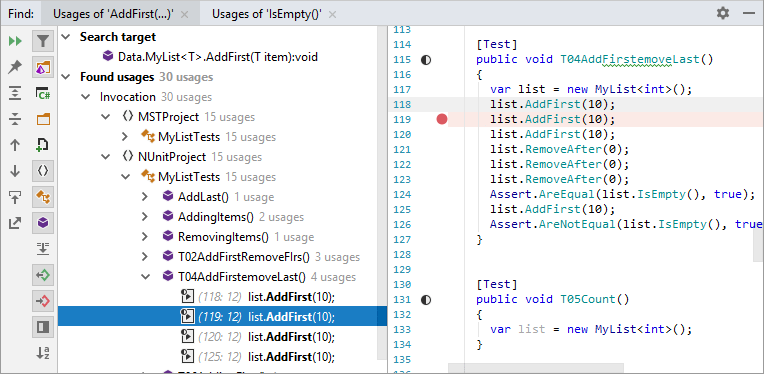Analyze search results
If any of the JetBrains Rider's navigation and search actions produces multiple results, these results can be displayed in the Find window, which provides a lot of ways to analyze the search results.
Some actions, for example Find Usages automatically display the results in this window. For other actions, you can do it manually when a popup with the search results is displayed — click Open in Find Tool Window , press Shift+Enter or + on the numeric keypad .
Results of each new navigation or search action are displayed in a new tab of the Find window, so you can easily get back to previous searches.
To cycle through the tool window tabs, press Alt+Right and Alt+Left.
If you close the Find window, you can always reopen it by choosing in the main menu or by pressing Alt+3. Tabs with search results are preserved until you close the solution.
In contrast to other navigation and search commands, the results of Find in Files Ctrl+Shift+F are by default displayed in the same tab of the Find window. If you want the results of previous textual searches to be preserved in different tabs, select Open Results in New Tab in the bottom left corner of the Find in Files popup:

Find window

Find window toolbar controls
Depending on the type of search results, the set of toolbar controls may vary.
Control | Name | Description |
|---|---|---|
Rerun Ctrl+F5 | Repeat the last search. | |
Pin Tab | Click this button to pin or unpin the current tab. You may need to pin a tab to prevent it from closing automatically when the maximum number of tabs is reached in this window. | |
| Expand All/Collapse All Ctrl+NumPad Plus/Ctrl+NumPad Minus | Expands/collapses all nodes in the current tab. |
| Previous/Next Ctrl+Alt+Up/ Ctrl+Alt+Down | Navigate to the previous/next item and scrolls through the source code accordingly. |
| Export | Click this button to export the data currently displayed in the window in text format . |
| Navigate with Single Click | When this button is pressed, the editor opens the file and scrolls it according to the items selected in the window. |
| Merge Occurrences on the Same Line Ctrl+F | When this option is selected, occurrences on the same line are shown as a single item. |
| Show Read Access Ctrl+R | When this option is selected, only read usages are displayed. Available for usages of fields, properties and local variables. |
| Show Write Access Ctrl+W | When this option is selected, only write usages are displayed. Available for usages of fields, properties, and local variables. |
| Sort Members Alphabetically | By default, members are sorted in the declaration order. You can click this button to display members in the alphabetical order. |
Title bar context menu and buttons
You can right-click the window title bar and use the context menu to configure its viewing mode, associate the window with a different tool window bar, or resize and hide the window.
You can also use the toolbar buttons:
Item | Shortcut | Description |
|---|---|---|
Shift+Escape | Hide the tool window . To hide all the tool windows, press Ctrl+Shift+F12. |
View code related to a search result
To open a specific result in the editor, double-click it or press Enter or F4.
To open the next/previous search result in the editor, press Ctrl+Alt+Down/ Ctrl+Alt+Up click /
on the window's toolbar or choose from the main menu .
To study the source code of the selected item right in the window, click Preview Source on the toolbar.
Filter search results
To filter search results by name, just start typing the part of the name in the window.
Search results of Find Usages can be further filtered by the kind of occurrence.
To show only read or write usages, click
or
on the toolbar.
Group search results
Search results are shown as a tree view, which can be displayed in various hierarchical orders. The default order depends on the initial search, but you can always change it with the grouping buttons on the toolbar.
By default, all results are shown as separate items. Sometimes it can be convenient to display all results found in the same line as a single item. To do so, click Merge Occurrences on the Same Line ![]() on the toolbar.
on the toolbar.
You can also group search results by kind of usage - that is, how exactly the target item is used at different places — for example, declaration, invocation, parameter, method return, and so on. To do so, click Occurrence type on the toolbar.